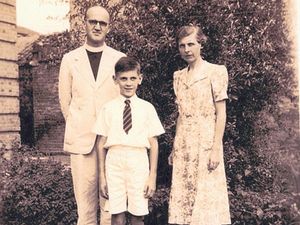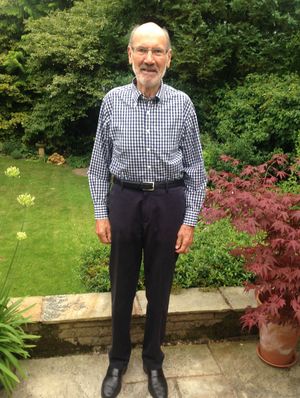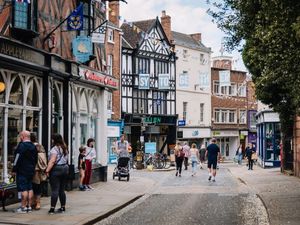Shropshire man, 88, shares family memories of Japanese internment camp for VJ Day
A Shropshire man who was kept in a Second World War Japanese internment camp for three years as a boy shared his story on VJ Day.

Ian Gedye, now 88, from Newport was just 10 years old when the Japanese invaded China and Wuhan, where his family lived on a Christian mission, became caught up in the war.
Ian was born in China, and when the war started he and his parents Jack and Kathleen were living at a large mission station in the city of Hankow where his father worked as a missionary. He said: “It was a fairly isolated existence. I went to school in the British concession each day by rickshaw and mixed with other children, but meeting friends outside school was difficult.”
After Japan launched its surprise attack on the US naval base at Pearl Harbour, Ian’s family was held under house arrest for a year before being transported down the Yangtze to be repatriated.
However, their boat was delayed, and the family were stuck in Shanghai for several months before being interned. Ian explained: “We had been confined in the British Country Club in Shanghai where my father and I slept on the floor of the gymnasium. After several months, we had an orderly transfer to Lunghwa Civilian Assembly Centre.
“The camp was set up in a girl’s high school that had been bombed. My father, mother, and I were allocated a single bedroom but, after a typhoon destroyed several wooden buildings, others moved in, so our accommodation became very cramped. There were 2,000 of us in the camp and everything – cameras, tools and atlases – was confiscated by the Japanese guards.”
'Camp was a great leveller'
Ian recalled how the interns quickly settled in. He added: “A committee was formed, and it wasn’t long before arrangements were made to start a school. Our own commandant was elected to organise doctors and nurses for the sanatorium, cooks for the kitchens, all the clergy including the Dean of Shanghai Cathedral volunteered to form the drain squad. Camp was a great leveller!”
While Ian’s life was quickly filled with school, playing with friends and making dens from bombed outbuildings, his mother’s health began to suffer as she put her son’s need for food ahead of her own.
He said: “We lived on congee; a thick porridge of rice largely disintegrated after prolonged cooking in water. Mother would often supplement my meagre rations with her own and, as a result, contracted sprue caused by malnutrition.
"It took two years to recover after the war while she attended the hospital for tropical diseases in London.”
After three years held captive by the Japanese, Ian saw the first signs that freedom was on the horizon. He added: “The most exciting thing was when three American fighter bombers flew low over the camp and started to bomb the airfield near the camp. They then flew back over the camp doing a victory roll as they passed overhead. We cheered fit to bust, much to the annoyance of the guards! This happened twice and we realised that things were coming to a head.”

His mother’s feelings on realising that they were soon to be liberated were captured in her diary. In an entry on August 15, 1945, she wrote: "Heard on the grapevine in the morning that the commandant had an important announcement to make in an hour’s time. As I hung up my last piece of washing there was a nearby rush of people to 'F' block and as I reached the front door, they all came rushing out and shouting that the war was over. Union Jacks appeared in all directions."
She wrote again on September 2, the day Japan's surrender document was signed, and said: "Jack, Ian and I went to community church. Thanksgiving Service. Travelled on open truck, arrived half an hour late at church. All camp folk taken out for tiffin.
"Mr. Hwang gave us a lovely Chinese meal and a pineapple desert. Got on a bus again at 3o/c and went to Lincoln Ave stayed three quarters of an hour – tea with Nancy and saw Gooch and Booth. Went on to chapel and had three quarters hr there.
"On our return journey waved and cheered to everyone. Arrived at 7pm wet tired after a very good day."
Ian remembered his own thoughts on VJ Day: “We were tremendously excited. The most exciting moment was when the Americans rolled into camp with their Jeeps and lorries and fed us a sumptuous evening meal, followed by a colour film."
Ian went into agriculture on the family's return to England, and in the 1960s was offered a job at Harper Adams College, now a university, near Newport.
The family moved to Shropshire, where they have remained ever since, and Ian and Barbara celebrated their 60th wedding anniversary today – the 75th anniversary of VJ Day.





